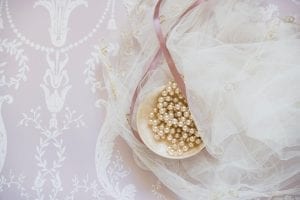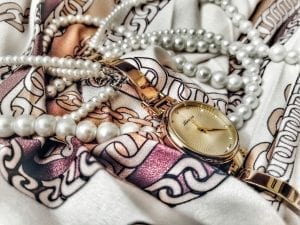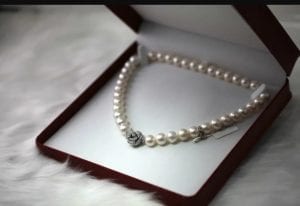POLISH YOUR PEARLS LIKE A PRO
We have always maintained that pearls should not be reserved for high days and holidays, and nothing takes the lull out of lockdown quite like glamming it up with your favourite string, ring or pair of earrings.
Of course, frequent wear means you may have to spend additional time on jewellery care. And since you won’t be able to visit our store for professional jewellery care until we reach the lower and less strict levels of lockdown, you’ll be happy to know that your precious pearls can be perfectly preserved during this time, as long as you follow a few simple instructions from yours truly.

PURCHASING PEARLS: NATURAL VS. CULTIVATED
Pearls are formed in oysters or mussels and can either be cultivated or naturally grown. Like most mainstream pearls, the pearls we use in our workshop are cultivated, but this does not mean that they are man-made or synthetic – it simply means that there was some human involvement in the natural process of pearl formation (i.e. people placed a small object in the mussel/oyster, which then grew into the pearl). Natural pearls are extremely rare and cost a small fortune, which is why we prefer to stick to the cultivated kind.
With a hardness (also known as scratch resistance) of two and a half, pearls are particularly prone to scratches, which is why the following guidelines on pearl care at home are so important.
WEARING YOUR PEARLS
Pearls are porous and do not react well to perfume, since perfume contains chemicals that will damage and break down the pearls. To avoid this, you should never spray perfume directly onto your pearls, or onto any part of your skin where your pearls may eventually come into contact with it. Hand sanitiser, like other chemicals, can also create a residue on pearls, so either avoid using this when wearing a pearl ring or bracelet, or remove your pearls when using the sanitiser.
STORING YOUR PEARLS
The way you store your pearls is also extremely important, since incorrect storage can lead to permanently (and completely avoidable) damage.
WRONG:

Correct:

As mentioned, pearls have a very soft surface and storing them with your other jewellery is bound to cause unsightly scratches. For this reason, pearls should always be stored separately, in their own container – this can either be the pouch or box that it was sold in – or carefully wrapped in tissue.
CLEANING YOUR PEARLS
When it comes to cleaning pearls, less really is more. Due to their fragile nature, pearls should not be soaked or cleaned with soap, and dipping should be avoided at all costs. Jewellery dips are designed to eat away at dirt, and since pearls are organic and porous, consisting mainly of calcium carbonate and calcite, they can disintegrate when left in strong detergents. The very best way to clean your pearls at home is to simply wipe them down carefully with a damp cotton cloth.
As you can see, jewellery care at home does not require expensive equipment or an excessive amount of time – all you need is some patience, a little time and a bit of TLC.
*This is the final post in our 3-part series on home jewellery care. Please subscribe to our newsletter for more useful tips on diamond care, gemstone care and gold and silver cleaning at home.
Website by Endor By Design

WhatsApp us